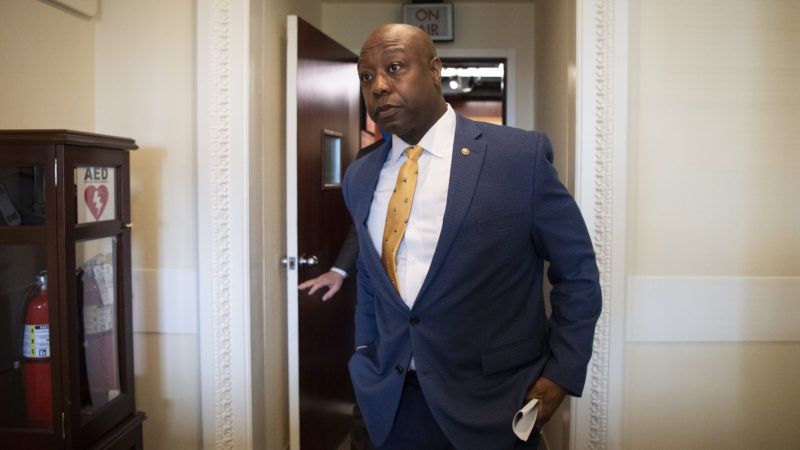Senate Republicans Have Introduced Their Own Police Reform Bill
The bill would incentivize police to ban chokeholds and create a national use-of-force database.

Senate Republicans unveiled their legislation today to address nationwide calls for police reform. The bill would incentivize police to ban chokeholds and create a national database on incidents where police seriously injure or kill someone.
Sen. Tim Scott (R–S.C.) introduced the bill, the Just and Unifying Solutions to Invigorate Communities Everywhere (JUSTICE) Act. The JUSTICE Act would, among other things, increase the penalties for filing a false police report and incentivize departments to create systems to share disciplinary records with each other to stop problem officers from being rehired. Another section, the Breonna Taylor Notification Act—named after a Louisville woman who was killed in a botched no-knock raid in March—would require states to collect and report data on the use of no-knock raids.
Most of the provisions rely on either extending or withholding federal grants to incentivize local and state police departments to participate. The bill goes neither as far as civil liberties groups and activists demand, nor as far as the Democrats' modest policing reform bill, but it contains several provisions that have bipartisan support.
For example, the legislation would make lynching a federal crime. It would also make it illegal for a federal law enforcement officer to have sex with people in custody. The so-called "law enforcement consent loophole" came to public attention after a 2018 BuzzFeed investigation about an 18-year-old New York City woman who said she was raped by two NYPD officers while handcuffed. The officers claimed it was consensual.
At a press conference on Capitol Hill this morning, Scott said the bill reflects both an acknowledgment of minority communities' anger, which erupted into nationwide protests following the police killing of George Floyd in Minneapolis, and a rejection of the idea that police departments are systemically racist.
"Too often we're having a discussion in this nation about, are you supporting the law enforcement community or communities of color?" Scott said. "This is a false binary choice."
"If you support America, you support restoring the confidence that communities of color have in institutions of authority," Scott continued. "If you support America, you know that the overwhelming number of officers in this nation want to do their job and go home to their families. This legislation encompasses that spirit."
Scott, the only black Republican senator, has often shared his own experiences of being pulled over by police or being asked to show his ID by Capitol Police.
Notably, the bill does not contain any provisions on qualified immunity, a legal doctrine that often shields police from liability in civil rights lawsuits. Groups across the ideological spectrum have been calling for qualified immunity to be repealed, but the White House, where Donald Trump is fighting for reelection as a "law and order" president, has indicated that it has no interest in reducing legal protections for police officers.
In the House, Rep. Justin Amash (L–Mich.) has introduced a standalone bill to repeal qualified immunity, which has attracted numerous Democrat co-sponsors but only one Republican.
Vanita Gupta, the president of the Leadership Conference on Civil and Human Rights and the former head of the Department of Justice's Civil Rights Division, said in a press release that Senate Republicans' legislation "falls painfully short in addressing longstanding issues of police misconduct and state-sanctioned violence."
"The legislation fails to pay down the immeasurable debt to justice created by our legacy of systemic racism," she said. "While we appreciate Senator Scott's efforts, the proposal does not go nearly far enough to offer the bold, comprehensive changes necessary to achieve the transformation and increased police accountability that this moment demands."
Senate majority leader Mitch McConnell (R–Ky.) said this morning that he will bring up Scott's bill for an initial procedural vote on the Senate floor next week, after voting on the confirmation of two appointees to federal circuit courts.
The bill will need 60 votes, including at least seven from Democrats, to proceed, but Senate Democrats have already signaled their displeasure with the legislation.
"We've only had the bill for a few hours and are reviewing it," Senate minority leader Chuck Schumer (D–N.Y.) said on the Senate floor. "But what's clear is that the Senate Republican proposal on policing does not rise to the moment."
Show Comments (45)